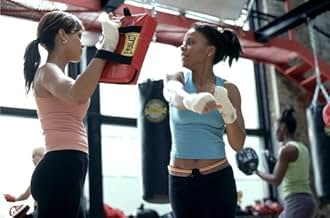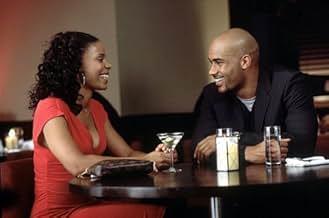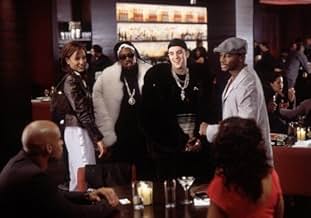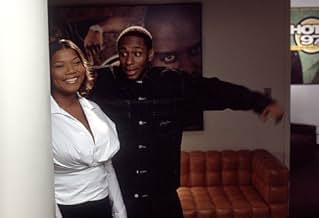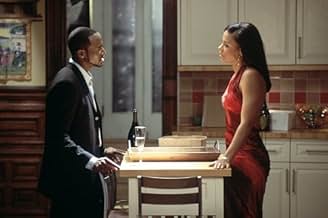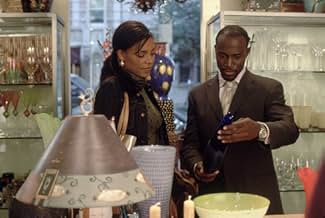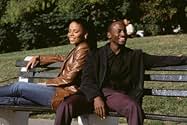Friends since childhood, a magazine editor and a hip-hop record executive stumble into romantic territory.Friends since childhood, a magazine editor and a hip-hop record executive stumble into romantic territory.Friends since childhood, a magazine editor and a hip-hop record executive stumble into romantic territory.
- Awards
- 2 wins & 18 nominations
- Chris 'Cav' Anton Vichon
- (as Mos Def)
Storyline
Did you know
- TriviaNicole Ari Parker and Boris Kodjoe are not only married in real life, but also play love interests on Soul Food (2000).
- GoofsDuring the scene where Sidney and Dre are walking through The Mall in Central Park, you can hear someone giving set directions.
- Quotes
Dre: It's when you talk like that, that's what makes me think that you're jealous.
Sidney 'Syd' Shaw: What?
Dre: Yes. Jealous!
Sidney 'Syd' Shaw: [throws a cookie on the table] No wonder you two are married, you're both crazy! Look here, contrary to what you and your wife may think, I don't spend my nights thinkin' about you, okay?
Dre: Shh! Lower the voice.
Sidney 'Syd' Shaw: I got a man who's fine, intelligent, successful, and gives it to me on a very, very regular basis and the s**t is the bomb!
Dre: So! I don't care what -
Sidney 'Syd' Shaw: Dre I need you to be happy for me. I need you to be there for me, just like you asked of me. So - so I can have tea and eat cucumber sandwiches with the crust cut off!
[throws more cookies on the table in frustration]
- Crazy creditsBoth "De La Soul" and "Method Man" are credited in the opening credits and not in the end credits. Therefore, the IMDb ordering uses the opening credits first and fills in the rest with the end credits.
- SoundtracksAct Too (Love of My Life)
Live and studio versions
Written by Common (as Rashid Lonnie Lynn), James Poyser (as James Jason Poyser), Tariq Trotter (as Tarik L. Collins), Leonard 'Hub' Hubbard (as Leonard Hubbard), Questlove (as Ahmir Thompson)
Performed by The Roots
Courtesy of MCA Records
Under license from Universal Music Enterprises
This film fits into both categories but is far better than most of its fellow films. The hip-hop culture is a childhood background that has turned into a profitable lifestyle for Dre and Sid, the two main characters. Their careers are products of the American craze for pop culture but their love for hip-hop is strong enough to allow them the hope that they can somehow make a difference in the business. Films with black stars tend either to drown them with imagery of the ghetto (a la Menace II Society, Baby Boy, etc) or completely ignore the African-American element, dress the characters in business suits, and absorb them into the "white" corporate world of success. Brown Sugar does neither. Hip-hop is natural to Dre and Sid and is present in their conversations without being obtrusive. Writer Michael Elliot is wise to let them lead their lives in the corporate world without ever losing their childhood backgrounds.
In the other camp, romantic comedies generally sacrifice character development and plausibility to accomodate the dreaded near-misses, love misunderstandings, and the climatic scene where the man publicly confesses his undying love. For the most part, Brown Sugar steers clear of these pitfalls and remains true to its characters. The movie never pretends that any of its characters are perfect or indeed that any of them are ever sure of any of their emotions. This is not a fairy tale movie where characters have sex because they are in love. This film is more realistic. The characters are young and romantic at heart and for one reason or another, they find sex first. That then leads them to at least the misguided pretense of love. As one character explains it, "put a man and a woman together for long enough and something's bound to happen." Infidelity is shown as a sign of emotional uncertainty not of villainy. Even the best of the characters eventually considers it. But neither Famuyiwa's camera or Elliot's script vilify them for it. The characters earn the viewer's sympathy despite their mistakes and when confronted by their angry spouses, they do try their best to be honest and direct.
The script also avoids the kinds of contrived jealousy traps that most romantic comedies rely on. When one character finally falls for another and acts on his feelings, he is not lead astray by a misunderstanding. He arrives early enough to realize that she has managed to find love elsewhere while he was making up his mind, but too late to do anything about it. Even the public pronouncement of love is cleverly flipped. All in all, this movie should be watched by anyone who has seen one too many weak romantic or African-American comedies and needs to be reminded that a string of bad movies does not ruin a genre.
- How long is Brown Sugar?Powered by Alexa
Details
- Release date
- Country of origin
- Language
- Also known as
- I Used to Love Her
- Filming locations
- Production companies
- See more company credits at IMDbPro
Box office
- Budget
- $8,000,000 (estimated)
- Gross US & Canada
- $27,363,891
- Opening weekend US & Canada
- $10,738,882
- Oct 13, 2002
- Gross worldwide
- $28,316,451
- Runtime1 hour 49 minutes
- Color
- Sound mix
- Aspect ratio
- 1.85 : 1
Contribute to this page





